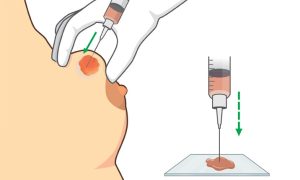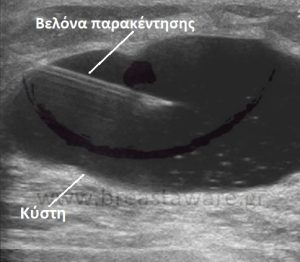Fine Needle Aspiration (FNA): A Simple and Reliable Diagnostic Method
The Fine Needle Aspiration (FNA) is the least invasive technique of all available diagnostic breast biopsies. Using a very fine needle and negative pressure through a syringe, a small amount of cells is collected from a suspicious breast lesion, to be sent to the cytology laboratory for microscopic analysis.

How Is the Examination Performed?
The process is quick, simple and almost painless. It is usually performed in an outpatient setting and local anesthesia is rarely required, as the needle is so fine that it does not cause pain. The examination takes about 20 minutes, and in some cases a small bruise may occur, which subsides within a few days.
When Is FNA Indicated?
The Breast FNA is applied when there is a need for:
- Assessment of suspicious lesions in the breast
- Aspiration of contents from cysts for cytological evaluation (especially if the fluid is bloody or suspicious)
- Diagnosis of metastatic lymph nodes in the armpit, in cases of breast cancer
If the mass is palpable, the puncture can be performed without the aid of ultrasound. In non-palpable or indistinct lesions, ultrasound guidance is used for greater accuracy.
FNA is a valuable tool for disease staging, as it allows preoperative assessment of cancer and planning of appropriate treatment (NCCN, 2024).
Advantages of FNA
FNA is safe, immediate and has been proven to be highly reliable, with diagnostic accuracy ranging from 85% up to 98% in selected studies (Silverman et al., 1993; Ciatto et al., 2004). It is extremely useful as an initial examination of palpable masses and helps in quickly making a decision for further investigation or treatment.
Are There Limitations?
While very useful, FNA has limitations:
- It cannot accurately distinguish in situ from invasive cancer, which plays a crucial role in making therapeutic decisions (e.g. sentinel lymph node biopsy).
- Its reliability depends on the experience of the cytologist, as there is a risk non-diagnostic samples or false negative results.
- In some cases, especially when it comes to non-palpable or complex lesions, may be preferred core needle biopsy, which provides more histological information (Berner et al., 2003; Yagil et al., 2020).

Conclusion
The fine needle aspiration is a simple, safe and minimally invasive method that contributes significantly to the diagnosis of breast diseases and the planning of the appropriate therapeutic approach. Its choice must be made in the appropriate clinical context and always by a specialized health team.
For more information, visit www.breastaware.gr - the modern Greek platform for breast health.
Breast Aware: because knowledge is power.
Bibliography:
- Silverman JF, et al. The triage role of fine needle aspiration biopsy of palpable breast masses: A community hospital experience. Cancer. 1993;71(4):1247–1251.
- Hatada T, et al. Diagnostic value of ultrasound-guided fine-needle aspiration biopsy in patients with palpable breast tumors. Breast Cancer. 2000;7(2):131–137.
- Yagil Y, et al. The diagnostic value of core needle biopsy and fine needle aspiration in palpable breast lesions: a comparison. Breast J. 2020;26(5):947–951.
- Berner A, et al. Fine-needle aspiration cytology vs. core biopsy in the diagnosis of breast lesions. Diagn Cytopathol. 2003;29(6):344–348.
- Saleh F, et al. Accuracy of fine needle aspiration cytology (FNAC) in the diagnosis of breast lumps. J Coll Physicians Surg Pak. 2020;30(5):502–505.
- Ciatto S, et al. Fine-needle aspiration cytology of breast masses: sensitivity, specificity and diagnostic accuracy. Breast. 2004;13(3):165–171.
- Layfield LJ, , et al. Interinstitutional comparison of fine-needle aspiration cytology and histopathology of the breast: a study of 1,678 cases. Acta Cytol. 2014;58(2):155–160.
- National Comprehensive Cancer Network (NCCN). Breast Cancer (Version 5.2025)
